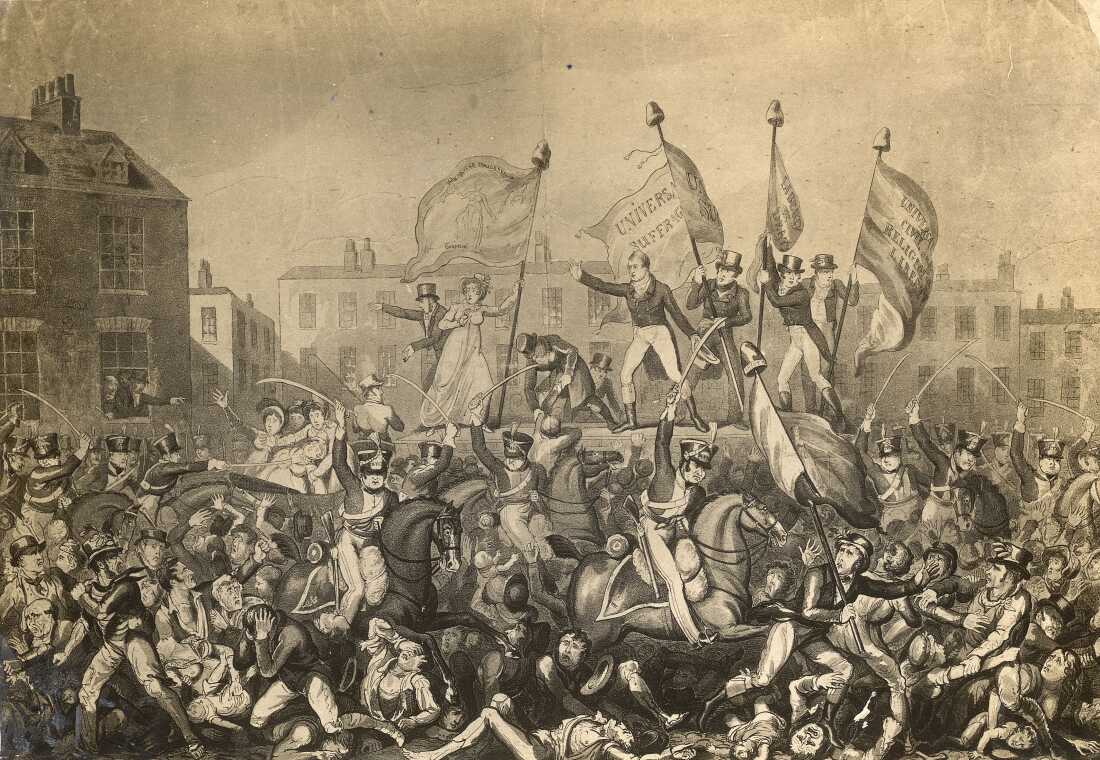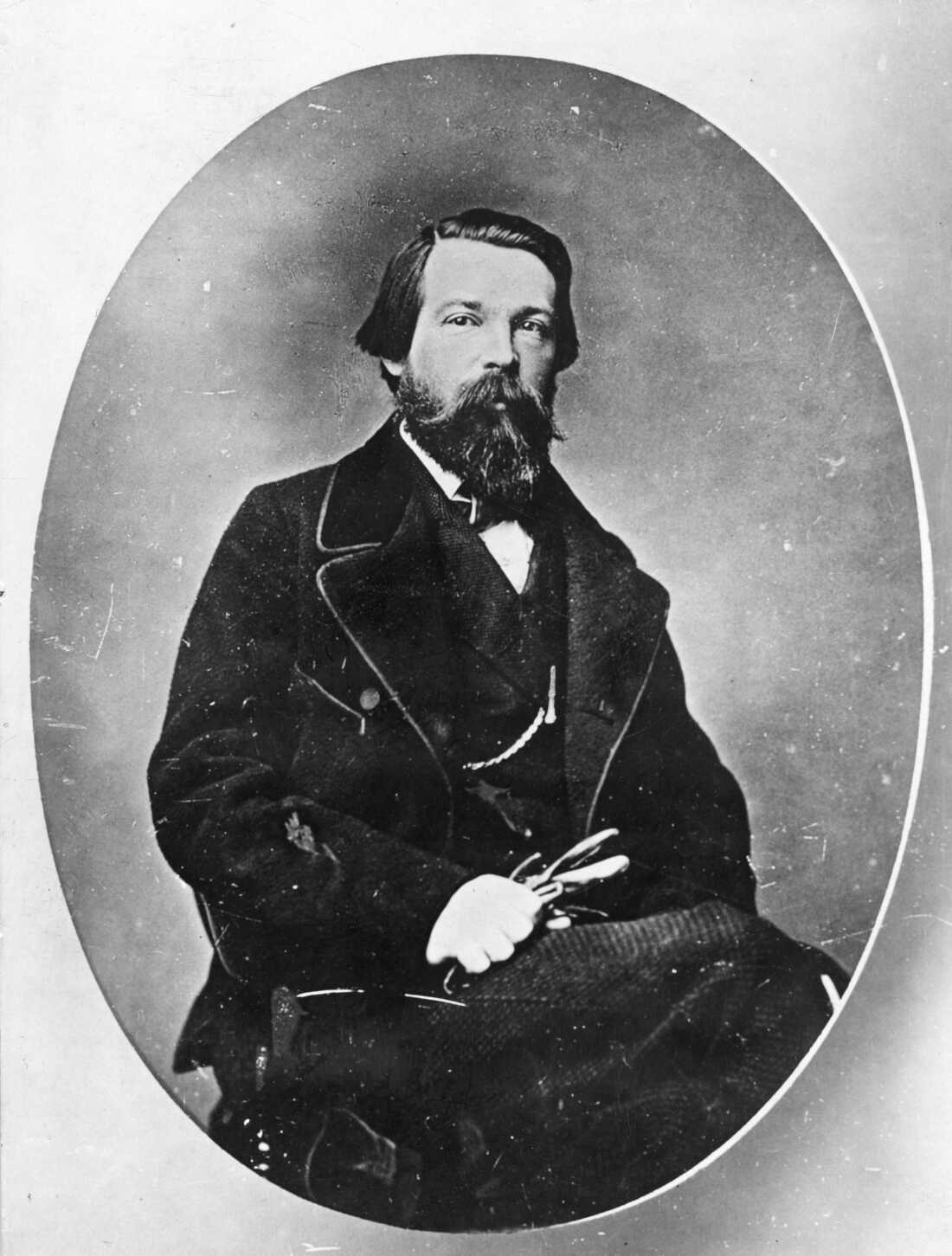
British forces cost crowds throughout bread riots in Manchester, England, in 1819. The occasion grew to become generally known as the Peterloo Bloodbath, when troops have been ordered to disperse the crowds.
Rischgitz/Getty Photos
disguise caption
toggle caption
Rischgitz/Getty Photos
MANCHESTER, England — Within the heart of this industrial metropolis in northern England, a memorial commemorates protesters killed right here at an indication for employees’ rights in 1819, in what grew to become generally known as the Peterloo Bloodbath. The British cavalry charged at employees who had gathered to demand political illustration, killing at the least 18 folks and injuring tons of.
On the monument to these killed, arrows level outward to Pennsylvania, the place unarmed strikers have been killed on the Lattimer mine in 1897, and to South Africa, the place peaceable protesters have been killed at an anti-apartheid rally in Sharpeville in 1960.
What hyperlinks these locations is a shared historical past of employees’ struggles and other people’s uprisings around the globe. The monument isn’t the one factor placing Manchester on the heart of this lengthy custom.
These days, politicians from throughout the political spectrum, from america to the UK and plenty of nations around the globe, scramble to enchantment to working folks, however discussions concerning the political energy of the working class first gained prominence in Nineteenth century Britain. That is the place, throughout the Industrial Revolution, a brand new city working class was shaped and got here collectively to demand rights and illustration. Nowhere was this extra evident than in Manchester.

Folks and horse-drawn carriages are seen in Manchester circa 1880.
Francis Frith/Getty Photos
disguise caption
toggle caption
Francis Frith/Getty Photos
The world’s first industrial metropolis
Manchester was the world’s first trendy industrial metropolis, and its city working class — and the abysmal circumstances they have been dwelling in — impressed the theories of German philosophers Friedrich Engels, who lived within the metropolis for 20 years, and his buddy and collaborator Karl Marx.
Engels wrote concerning the emergence of this group of laborers in his 1845 ebook, The Situation of the Working Class in England. In it, he describes “the working-men’s dwellings of Manchester” as being so horrible that “only a physically degenerate race, robbed of all humanity … could feel comfortable and at home.”
“Manchester becomes a symbol for the working classes” within the 1800s, says Charlotte Wildman, a historian on the College of Manchester.
Town’s political significance continues to reverberate around the globe immediately.
Manchester’s fast industrialization and the start of employees’ actions
Within the early Nineteenth century, Manchester grew to become the heart of the world’s cotton commerce. The demand for cotton items as a part of the trans-Atlantic slave commerce performed a key position within the fast industrialization of the town. Agricultural employees from throughout Britain moved there to work.

Cotton mills on Union Road in Manchester in 1850.
Rischgitz/Getty Photos
disguise caption
toggle caption
Rischgitz/Getty Photos
“There wasn’t really anywhere for them to live,” Wildman explains. “There were high levels of poverty, illness and diseases.”
On the identical time, the Industrial Revolution was making some folks rich. The massive wealth hole fueled resentment and calls for for higher circumstances.
“That very visible sense of rich and poor gives this new urban working class a clear identity and a sense of oppression,” Wildman says.
Employees weren’t allowed to vote. These in energy have been reluctant to provide working males the vote as a result of they did not belief them, she says.
“They were trying to keep away the men that they saw as undesirable, particularly the kind of men who they deemed as criminal or feckless,” she says. Girls of any class weren’t even thought-about as deserving of the franchise.
However working-class actions started to collect tempo all through the Nineteenth century, progressively successful over some rights for these new city employees — though common suffrage for males in the UK didn’t occur till World Struggle I, in February 1918. The 1918 Illustration of the Folks Act gave some ladies the proper to vote for the primary time too — however solely these over 30 who owned a home or have been married to a home-owner. Girls didn’t achieve common suffrage till 1928.
Marx and Engels in Manchester

German thinker Friedrich Engels circa 1860.
Amsler & Ruthardt/Edward Gooch Assortment/Getty Photos
disguise caption
toggle caption
Amsler & Ruthardt/Edward Gooch Assortment/Getty Photos
Nineteenth century thinkers flocked to Manchester to chronicle the working class, together with Engels and Marx.
Engels moved to Manchester in 1842, at age 22, to handle his father’s cotton manufacturing facility on the town’s outskirts. “Engels lived in Manchester for 22 years and Marx visited him there for months at a time,” says Manchester-based author John Schofield.
Engels’ father had despatched him to work on the household’s manufacturing facility there “to rid him of his extreme political views,” says native historian Ed Glinert, who provides strolling excursions of the German philosophers’ previous haunts across the metropolis. “His father said a proper job at the family firm in Manchester would make him drop all the politics and become a good citizen.”
Actually, the town had the other impact on him.
“Friedrich Engels walked into a very febrile situation in Manchester in 1842,” says Schofield.
There had simply been a riot of millworkers within the metropolis and unrest and protests continued all through the 1840s. Engels even believed they may result in revolution within the metropolis.
Engels and Marx would work collectively at a desk within the metropolis’s Chetham’s Library, writing about employees and sophistication wrestle.

German thinker Karl Marx circa 1866.
Hulton Archive/Getty Photos
disguise caption
toggle caption
Hulton Archive/Getty Photos
The small wood desk within the library studying room is “one of the most important desks in the history of the world,” Schofield says. Drafts of the Communist Manifesto and Das Kapital (Capital) have been written at that desk, he says, with Marx sitting at one finish and Engels on the different.
Historian Wildman says the struggling the philosophers witnessed proper on their doorstep helped form their concepts.
“Marx and Engels would literally look out of the window of Chetham’s Library where they were writing and see this huge amount of poverty and people suffering,” she says.
Though Engels continued to assume a revolution may occur in Manchester, ultimately, it by no means did. However what was occurring within the metropolis was linked to and impressed different actions occurring within the mid-Nineteenth century in Europe.
“There were waves of rebellions throughout Europe in the mid-19th century,” Wildman says. “People were picking up on similar processes and on the desire to have better standards of living.”
Politicians started to concentrate, too.
“What Engels and Marx did was turn the working class into a political commodity,” says native historian Glinert. “For the first time, there was a class analysis of society which people hadn’t really thought of in the past.”
The worldwide wrestle for employees’ rights, from Manchester to Pennsylvania
In Manchester’s Folks’s Historical past Museum, devoted to working-class historical past, the world’s oldest-surviving commerce union banner hangs alongside posters linking worldwide employees’ struggles from the Nineteenth century to the current day.
What started in Manchester with an 1819 bloodbath of peasants gave beginning to the world’s first employees’ actions, commerce unions and an concept of equality that has fueled social justice and labor actions around the globe.
The museum charts a historical past of worldwide solidarity with employees that began in Manchester and that has reverberated via political discourse ever since.



